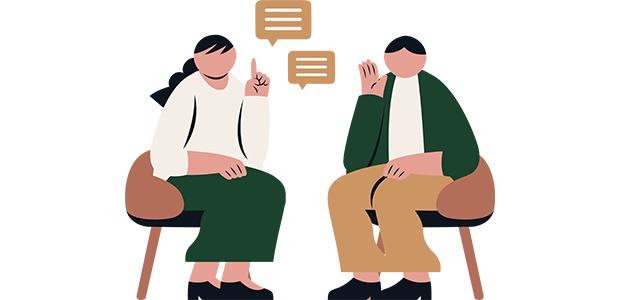
Why work would be much better if we all stopped waiting to speak
When was the last time you asked for directions? Perhaps you’re too proud. And now we have Google Maps, the need to plead with another human to show us the way is reassuringly rare. But I asked for directions last week and came completely unstuck.
It was on a work trip, in a three star hotel. I’d booked a magical aromatherapy massage as a treat after a long day of workshops but this hotel was big, the corridors vast, and I couldn’t find the damn spa. Eventually I asked the guy at reception.
“Excuse me, sorry!” (Textbook Brit.) “Could you tell me where the spa is?”
“Oh yes, madam,” he said. “It’s actually in an outbuilding, so quite tricky to find! You turn left, go down the long corridor, through the double doors and take an immediate left, go up in the lift to level one and walk down until you reach another pair of double doors, pop down in the lift to the lower ground, walk out the exit and then follow the path around until you see the sign for the spa. It’s about a minute away.”
I was 15 minutes late for my appointment. Why? Because I was so focused on showing the guy on reception that I was listening, with frequent enthusiastic nods and repeating “yep, yep, yep,” that I forgot to actually listen. Zen destroyed, lesson learned.
There’s so many ways to not listen to someone. Not listening is an art form! There’s the distracted kind; listening with one eye on the rest of the room, or your phone, or the person you wish you were talking to. There’s the vacant kind; when someone’s decided in advance that you have nothing interesting to say, and so they quietly retreat into their own head. There’s the interruptive kind; the sentence finishers, the power speakers, the “what you meant to say was…” brigade. And then there’s the Whattaboutme listeners, who listen solely for an opportunity to make the entire conversation about them.
Good listening isn’t just good manners. It’s the difference between inclusion and exclusion, innovation and inertia, people staying versus people walking out the door. 83% of UK employees say voices in their organisation aren’t heard fairly or equally, and 60% believe their views are ignored by management. This offers up an entire theme park of emotional rollercoasters; of missed opportunities and avoidable tensions. And if you think back to the last meeting you were in, you’ll know exactly what I mean. Most people weren’t listening, they were waiting to speak. Or worse: on Zoom pretending to listen while answering an email on mute.
All of this pretending, this half-listening, this performance of attention adds up. The CIPD (2020) found that 62% of UK employees cite communication issues as the root of conflict at work and 80% of managers say poor communication between colleagues is the most frequent source of team tension. When that kind of conflict is costing the UK £28.5 billion a year (ACAS: 2024), being a better listener could make or break your business. It’s the small disagreement that escalates, the crossed wires in the middle of a client project, or gatekeeping the idea that could have changed the entire direction of the company, but never saying it because, what’s the point? Nobody listens anyway.
We’re always telling people to speak up in meetings. Be more visible. Take up space. “Say the thing!” And that’s fine, to an extent. But why do we never talk about speaking less? Why is nobody ever trained to just sit and listen? The workplace isn’t short of voices, it’s short of people actually paying attention to them.
How we listen to others is determined by so many things: our long-term judgements of a person, how much we think we know, how much we think they know, how they speak, what mood we’re in, even what we’ve eaten that day. In fact, it’s almost impossible to be completely objective in a listening situation, unless you actively try to be. But if you work with other humans (and I’m guessing you do), listening is one of the cheapest, fastest, most radical tools you can use to improve your working life.
So how can you guarantee being a good listener at work?
Ask a question: good listeners don’t feel the need to immediately respond to what someone says. Instead, they’ll often prompt for more insight, saying “go on…” Curiosity is an amazing driver of professional chemistry.
Park the bias: it’s easy to assume we know what someone’s going to say or what their intention is, but we’re not mind-readers. Assume positive intention in conversation unless given proof you should do otherwise.
Listen to words, not tone: far too many people are unfairly reprimanded for their “tone” at work. This is potentially discriminatory. Focus on the words someone uses, rather than the pitch or volume of their voice, and watch your interactions become far more positive.
Repeat back to them what you heard: acknowledgement and verification are the perfect way to make sure everybody’s on the same page.
‘Yes, and’ rather than ‘No, but’: lean on the rules of improv and insist that people in meetings take a “Yes, and” approach to ideas, always finding the good and how it could be improved upon, rather than instantly disagreeing.
Work relationships are like any other long-term relationship. They need maintenance, give-and-take and reflection. Communication is what makes the whole thing function. And listening? Listening is the bit we’ve forgotten how to do. We should reward great listeners at work. Because sometimes, you don’t need to dominate the conversation. You just need to be the one who remembers what was said.
For more startup news, check out the other articles on the website, and subscribe to the magazine for free. Listen to The Cereal Entrepreneur podcast for more interviews with entrepreneurs and big-hitters in the startup ecosystem.

